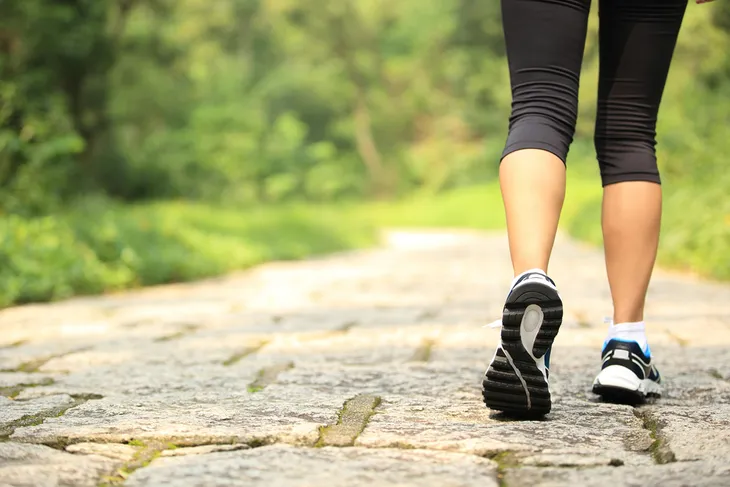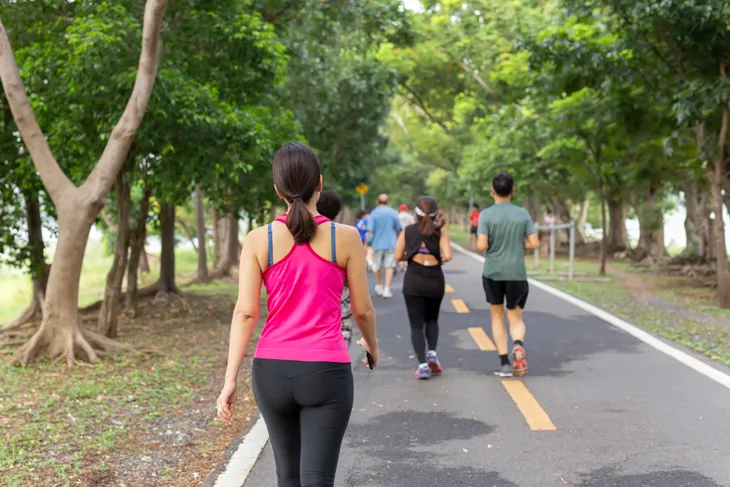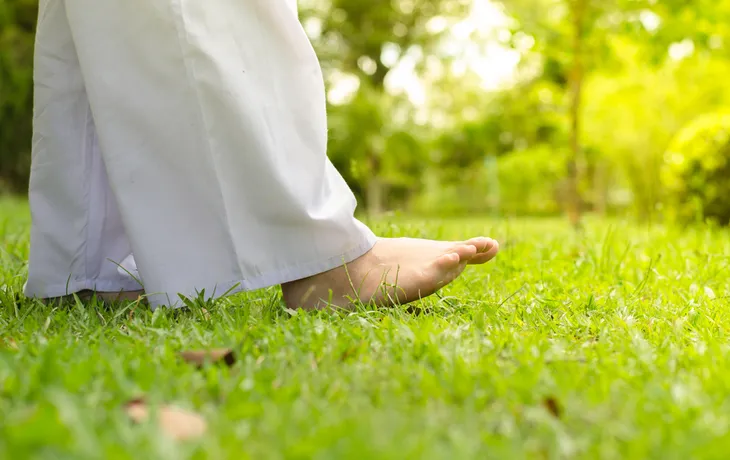You might have heard of the health benefits of daily walking. If you participate, what do you do while you stroll? Do you listen to headphones or scroll through social media? If so, you’re missing out on the complete benefits package.
Why not make your next outing a meditative walk? You don’t need any more equipment than you do for a regular stroll around the block — you should preferably leave the phone at home. Here’s how to implement this practice into your routine — plus, learn some of the benefits you’ll enjoy.
What Is a Meditation Walk?
What is a meditation walk, anyway? Isn’t that what Buddhist adherents do in flowing robes and bare feet? While you can leave your shoes behind if you like, a meditation walk benefits people of all religious faiths — or none. What the practice entails is similarly marrying the mind and body, as in yoga. However, instead of tying yourself into a pretzel to reach enlightenment, you lace up your tennis shoes.
The critical component includes drawing your mindfulness to the task at hand. You can do this in several ways. Some schools of thought have you break down the elements of each step and notice the actions you often perform automatically. According to Jon Kabat-Zinn, the founder of Mindfulness-Based Stress Reduction, you should practice sauntering slowly and taking small steps to immerse yourself in contemplation by focusing on each motion.
You can get creative, as long as you remember that the objective is to center yourself in the present moment. Close your eyes and feel the breeze against your skin. Can you taste the air? What sounds do you hear?
Benefits of Meditation Walks
You might be thinking, “Meditation walks sound lovely, but why should I make the time for one?” You have a valid point. Life is more hectic than ever — which is precisely why you need this practice to reap the mental and physical health benefits. Doing so will give you the strength to handle the rest of your responsibilities without losing your composure or going prematurely gray.
What are the mental and physical health benefits of meditation walks? Here are the top 10 perks you can reap:
They Relieve Stress
Did you know we do typically need a little positive stress in our lives to stay motivated? Otherwise, you might never motivate yourself to get off your couch. However, too much pressure can significantly damage your mental and physical health.
When you feel threatened, your body releases the hormones adrenaline and cortisol. Adrenaline comes and goes, but cortisol sustains your body for prolonged battles — such as trying to outrun a wounded and angry bear. However, dealing with a micromanaging boss or struggling to make ends meet are problems that take longer to fix than it does to outpace a bruin.
That means your cortisol levels remain elevated — which has profound physiological implications. Too much of this hormone raises your blood pressure and cholesterol levels while decreasing immune function. If that sounds like a recipe for illness, you’re correct. Elevated cortisol also impacts your mood, making you jumpy and irritable. It can also prompt you to overeat, which leads to weight gain and further health risks.
They Provide Moderate Cardiovascular Activity
Moderate-intensity cardiovascular workouts get your heart pumping at around 120 to 140 beats per minute throughout your workout duration. Experts advise taking 150-minutes of such exercise weekly. While this period translates to approximately 30-minutes daily, you don’t have to do so in one uninterrupted session.
If you take a 10-minute meditation walk each day, you only need to complete 20 additional minutes of cardiovascular activity. You can cut down on your elliptical time or enjoy a more invigorating evening outing with your kids after dinner.
They’re a Positive Distraction
Sometimes, you need to step away from your desk to make any progress at work. This statement isn’t new-age fluff — it’s grounded in science. Productivity gurus know that neither the human mind nor body is designed to work nonstop. People tend to pay attention when their physical selves start to tire, but the modern workday wasn’t designed to benefit the psyche.
In the late 1980s, Francesco Cirillo invented the Pomodoro Technique for maximizing productivity. With this method, you work for 25 minutes, then take a short break for five minutes. After four pomodoros, you take a rest of 15 to 30 minutes.
What do you do during the short rest periods? You could stroll over to the water cooler for the latest juicy gossip. However, you could get into a conversation that eats up your time and leaves you working late. Instead, why not take a brief mindfulness walk? The pause gives your mind the rest it needs without getting caught in another activity that distracts you from work.
They Lower Your Cardiovascular Disease Risk
Stress can do a whammy on your heart — and so can the unhealthy behaviors the emotion spurs. Remember that pesky cortisol? If you’re one of the many people craving carbs more these days, that hormone lurks behind your renewed lust for chips and cookies.
You’ve had a horrendous morning at work, and you need a break. The vending machine sings songs of corn chips and trans-fat-laden baked goods like an evil siren. Try taking a meditation walk instead, if only for two to three minutes. You may give yourself enough time to realize that you weren’t hungry after all. You merely needed to get your hormones under control the natural and healthy way.
They Help You Maintain a Healthy Weight
Giving in to the occasional craving for a bag of salty chips won’t land you in the ER. However, many people turn to food as a coping mechanism. They use it to distract themselves from unpleasant emotions instead of filling their bodies with nourishment.
However, your emotions alone can’t harm you if you manage them. The next time you feel overwhelmed, go for a meditation walk. While you stroll, allow yourself to feel the anger, frustration, even rage, that have your head spinning. Observe the physical sensations that arise — does your heart begin beating faster? Do you feel supercharged with nervous energy?
By making the mental connection between your physiological and emotional state, you can manage the resulting behaviors more readily. Give yourself five minutes to walk meditatively before pouring yourself a drink or diving into that donut. It might make you realize that putting unhealthy substances in your body will only compound your problems. The reduced caloric consumption will follow naturally, making it effortless to shed excess pounds.
They Help You Regain Focus
Your brain consists of muscle tissue, albeit different from the striated type in your arms and legs. However, like any body part, it can grow tired after prolonged concentration. Few would expect you to do biceps curls for two hours without a rest, but many folks think nothing of sitting at their desk for that long. Is it any wonder that your concentration starts wandering by mid-morning?
A study published by the University of Maryland School of Public Health examined adults with mild cognitive impairment, a precursor to Alzheimer’s disease. They found that exercise decreased blood flow to brain regions identified as hotspots. This decrease correlated to improved performance on a word association test designed to measure cognitive ability.
You would think that exercise stimulates blood flow to the brain, and it does. However, in this circumstance, participants already demonstrated increased blood flow as their body responded to injury with inflammation. Movement helps reduce the inflammatory response. Assuming you’re healthy, a meditation walk will get oxygen-rich blood flowing to your noggin, increasing alertness. It also inhibits the inflammation associated with cognitive decline.
They Boost Your Creativity
If you work in a creative field, you know how it feels when you hit the proverbial wall. You know there’s a solution to your problem, but sometimes, you have to let what writer Stephen King refers to as “the boys in the basement” do their work. You need to stop pushing so hard and allow fresh ideas to flow into you.
Think about a pitcher. If it’s already full of water, you get a mess if you try to add more. A meditation walk cleans out the mental clutter — think of it as washing old, moldy pond fluid from your brain. Once clear, it’s ready to accept the inspiration for which it previously lacked room.
They Improve Your Mood
Exercise eases depression and anxiety, and so does getting outdoors. When you combine the two, you get a powerful one-two punch that can improve nearly any foul mood. Research indicates that outdoor movement provides significantly higher benefits than the same workout inside.
Does that mean you can’t do a meditation walk on a treadmill? You can, but you’ll have to work harder to tune out distractions. Make this introspection a part of your practice — can you train your brain to ignore the sounds of grinding gears and snippets of gym floor gossip?
They Make You Feel Connected to Nature
Many humans have lost their connection to the natural world — and their mental and physical health suffers as a result. Plus, the shift toward an indoor lifestyle hasn’t treated the planet kindly. When you feel out of touch with the environment, you typically don’t pause to realize that an empty water bottle you tossed in the trash could kill marine wildlife.
Research by the European Centre for Environment and Human Health discovered that people who regularly visited natural spaces engaged in more green behaviors than those who did not. Global warming hasn’t ceased to threaten humankind, even though news broadcasts devote time to other issues. If taking a meditation walk can help you treat the planet with respect, Mother Nature will thank you.
They Put You in Touch With Yourself
How often do you find yourself thinking, “Where did today go?” as 9 p.m. arrives? Many people slide through life on autopilot, giving relatively little thought to what makes them tick and what they want to accomplish during their brief sojourn on Earth. They battle perpetual feelings of emptiness that introspection could cure.
A meditation walk can realign you with your life’s purpose. It forces you to shut out the countless distractions you face, from cell phone alerts to blaring news broadcasts. Through reflection, you learn to act instead of react. You gain insight into your goals and find the intrinsic motivation to work toward them with purpose.














